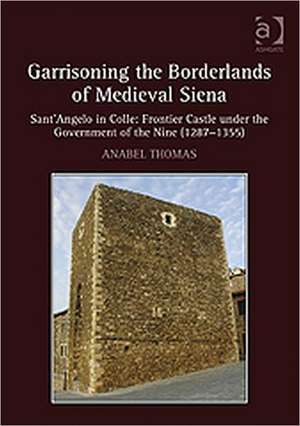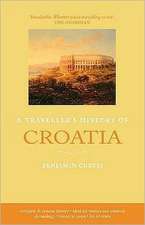Garrisoning the Borderlands of Medieval Siena: Sant'Angelo in Colle: Frontier Castle under the Government of the Nine (1287–1355)
Autor Anabel Thomasen Limba Engleză Hardback – 28 dec 2011
Preț: 834.60 lei
Preț vechi: 1149.10 lei
-27% Nou
Puncte Express: 1252
Preț estimativ în valută:
159.75€ • 173.58$ • 134.28£
159.75€ • 173.58$ • 134.28£
Carte tipărită la comandă
Livrare economică 21 aprilie-05 mai
Preluare comenzi: 021 569.72.76
Specificații
ISBN-13: 9781409426035
ISBN-10: 1409426033
Pagini: 464
Dimensiuni: 174 x 246 x 31 mm
Greutate: 1.27 kg
Ediția:1
Editura: Taylor & Francis
Colecția Routledge
Locul publicării:Oxford, United Kingdom
ISBN-10: 1409426033
Pagini: 464
Dimensiuni: 174 x 246 x 31 mm
Greutate: 1.27 kg
Ediția:1
Editura: Taylor & Francis
Colecția Routledge
Locul publicării:Oxford, United Kingdom
Cuprins
Contents: Preface; Introduction; Documentary sources and medieval toponyms; Appendices; Part I Topography and Demography: The Territory: Boundaries, demarcations and the politics of land ownership; The Urban Fabric: Walls, gates and waterways; Public institutions, key buildings and private houses: accommodating the statistics and locating the structures. Part II Society and Societal Values: The People: The homeless, the dispossessed, the poor and the 'mezzadria'; Widows, wives, spinsters and daughters: poor relations or women with prospects?; The male elite: Sienese 'outsiders', seven rich locals and two exceptionally wealthy clans?; Civic Awareness: Piety, charity and social welfare; Embellishing the fabric; Afterword; Bibliography; Index.
Notă biografică
After a career in University teaching in the UK, most recently in the department of Art History at Birkbeck College, University of London, Anabel Thomas has for the last ten years lived in Tuscany. She is the author of The Painter's Practice in Renaissance Tuscany (Cambridge University Press, 1995) and Art and Piety in the Female Religious Communities of Renaissance Italy (Cambridge University Press, 2003) as well as of articles in learned periodicals in the UK, USA, and Italy.
Recenzii
'This is a meticulous and detailed study of a small frontier community on the southern borders of the territory of Siena, an Italian city-state in the late 13th and early 14th centuries, in a famed and much studied period of its history. The author has a full command of the historical sources, an excellent knowledge of the historiographical debates concerning the issues she addresses, and, as a resident of the village, an intimate feel for its architecture and topography and more generally its past, present and future. This is both micro-history and the longue durée at their finest.' Peter Denley, Queen Mary University of London, UK 'Thomas has done a fine job of reconstructing the commune of Sant’Angelo in Colle during its period as a Sienese frontier settlement. She uses her source material admirable, teasing out the specifics of individual people and their use of land and space. Her discussion of the artwork in San Michele and the pietyof wealthy patrons in Sant’ Angelo is particularily illuminating... Thomas’s Garrisoning the Borderlands of Medieval Siena provides a close, if isolated, analysis of Sant’ Angelo in Colle. She has done much to illuminate life in the commune, using her source material to its fullest extent.' Comitatus 'Thomas’s book provides interesting and detailed analyses of certain social dynamics and some aspects of the mentality connected to piety and devotion... it represents a sound contribution to the history of late medieval Tuscan countryside. Future studies in this field will surely profit from it.' The Medieval Review 'This volume provides an excellent analysis and exploration of a Tuscan frontier town and its varied population in the early 14th century; it certainly brings alive the walls, house plans and artefacts that medieval archaeologists have uncovered across this and other parts of Italy.' Journal of Medieval Archaeology
Descriere
Through a close study of local demographies and topographies and primary source material in the form of tax returns and notarial records, this study considers the development of urban fabrics and patterns of piety, charity and patronage in Siena's southern contado during the thirteenth and fourteenth centuries. By extension, it also presents an analysis of the art and architecture of the region during this time.


